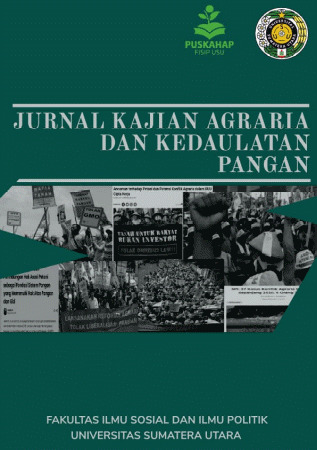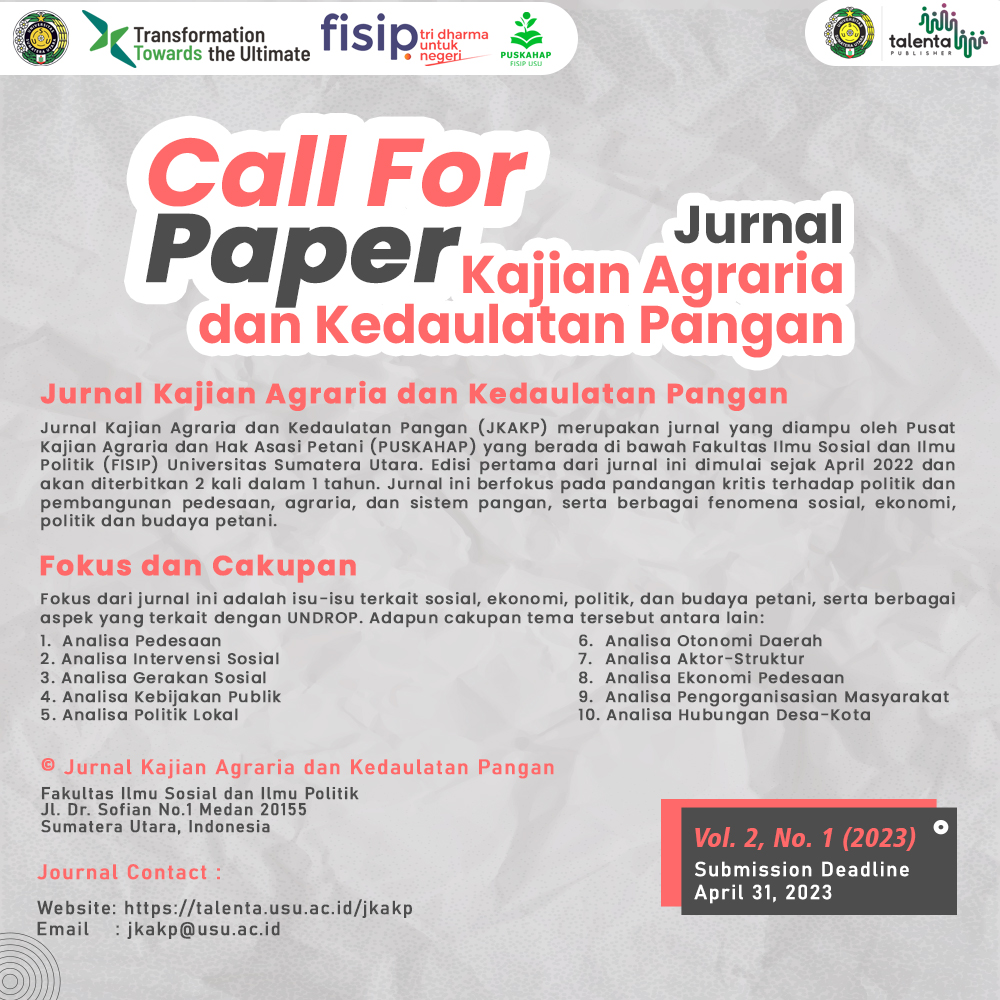PEMBERDAYAAN PETANI KOPI MELALUI KOMUNIKASI PEMBANGUNAN DEWAN KOPI INDONESIA (DEKOPI) DI KABUPATEN HUMBANG HASUNDUTAN
DOI:
https://doi.org/10.32734/jkakp.v2i2.13461Keywords:
Development communication, Farmer, Coffee, Dewan Kopi IndonesiaAbstract
Coffee is the largest commodity in the world. Coffee is also the second largest export after oil exports in Indonesia. In 2019 until now, Indonesia's coffee export ranking has decreased, which was originally ranked as the third largest coffee exporting country in the world, from 2019 until now it has fallen to fourth place. This is caused by a number of things, such as the low level of education on how to educate coffee to coffee farmers in Indonesia, the high price of fertilizers, and restrictions on the amount of subsidized fertilizers for coffee farmers, causing the quality of coffee plant cultivators to be poor. This problem has an impact on coffee farmers who are in the Humbang Ha Anglean area of ​​North Sumatra Province, Humbang Ha Anglean is one of the Arabica coffee producers in Indonesia, this problem has an impact on coffee farmers in the area. In this case the Indonesian Coffee Council (DEKOPI) as the largest coffee community in Indonesia, working with the government, created a program for coffee farmers called coffee storage houses, to accommodate coffee products from coffee farmers in Indonesia. This program is carried out by DEKOPI in collaboration with BUMN to prosper and prosper coffee farmers in Indonesia. And also to improve the yields of coffee farmers and the level of coffee exports in Indonesia can increase. This research uses a descriptive method with a qualitative approach. The results of this study indicate that the program formed by DEKOPI is still not effective, which is because the program has just been formed and has only been running for a few months, and if this program runs well and is effective, the effect will be felt for one or two next year.
References
Achyani, Sutanto. A, Faliyanti. E. (2018). Increasing The Value Of Commodities Organic Coffee Farmers In Srimenanti Village West Lampung. Ethos, 6(1), 11-18.
Creswell, J. W., & Poth, C. N. (2016). Qualitative Inquiry & Research Design: Choosing among Five Approaches. Los Angeles, CA: Sage Publications.
Disbunak, Sumut. (2022). Kementan RI Apresiasi Komitmen Dairi Kembalikan Kejayaan Kopi Sidikalang. Dinas Perkebunan Dan Peternakan Provinsi Sumatera Utara. http://disbunak.sumutprov.go.id/?p=4563
Haerul. Nurjaya, M. Hadija. Azisah. (2022). Tarjih Agriculture System Journal. Kajian Kondisi Eksisting Budidaya Kopi Robusta di Desa Bentenge Kabupaten Maros, 2(2), 129-134.
Majalah, Hortus, Archipelago. (2023). DEKOPI Bersama ID FOOD Gelar HKN di Seluruh Indonesia.
https://news.majalahhortus.com/dekopi-bersama-id-food-gelar-hkn-di-seluruh-indonesia/
Najiyati S, dan Danarti.1997. Budidaya Kopi dan Pengolahan Pasca Panen. Jakarta: Penebar Swadaya. hlm. 43.
N.D. Retnandari-Moeljarto Tjokrowinoto. 1991. Kopi: Kajian Sosial-Ekonomi. Jogjakarta: Aditya Media. hlm. 13.
Nurul, Rusdayanti. (2022). Tantangan dan Strategi Budidaya Kopi dalam Menghadapi Perubahan Iklim. Low Carbon Development Indonesia. https://lcdi-indonesia.id/2022/08/29/tantangan-dan-strategi-budidaya-kopi-dalam-menghadapi-perubahan-iklim/
Ponte, S. (2002). Thelatte revolution’? Regulation, markets and consumption in the global coffee chain. World Development, 30(7), 1099–1122.
P.S. Siswoyo. 1993. Kopi Internasional dan Indonesia. Jogjakarta: Kanesius. hlm 117.
Suhendar, A. (2022). The Influence of Multicultural Education on Democracy in Indonesia. Pancasila and Civic Education Journal, 1(1), 22-27.
United States Department of Agriculture. (2014). Coffee: World Market and Trade.
Yunita, P. (2021). Struktur Tata Kelola Global Value Chains Produk Kopi dalam Perdagangan
Kopi Global: Studi Komparatif Kopi Indonesia dan Kopi Vietnam. Jurnal Indonesia Sosial Sains, 2(5), 821-836.
Yosepha, Pusparisa. (2019). Jumlah Petani Kopi Dunia, Indonesia Posisi Tiga. Kata Media Network.
https://databoks.katadata.co.id/datapublish/2019/12/10/sebaran-jumlah-lahan-produsen-kopi-di-dunia
Oktasari, N, I & Trilaksana, A. (2014). Perkebunan Kopi Rakyat di Jawa Timur 1920-1942. AVATARA, e-Journal Pendidikan Sejarah, 2(1), 122-129.
World coffee trade. (2020). No Title. http://www.thecoffeeguide.org/coffee-guide/world-coffee-trade/, diakses pada 18 Maret 2020.
Downloads
Published
Issue
Section
License
Copyright (c) 2023 Jurnal Kajian Agraria dan Kedaulatan Pangan (JKAKP)

This work is licensed under a Creative Commons Attribution-ShareAlike 4.0 International License.







